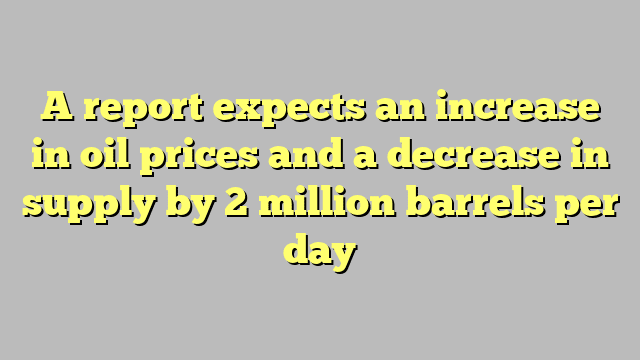A recent report sheds light on the developments in oil prices, according to global oil stocks that have not witnessed a decline due to the abundance of supply in the markets.
The report – issued by the Swiss investment bank “UBS” – confirmed that although demand for oil remains strong, supply from several locations witnessed a sudden rise.
He pointed out that the oil market may have turned into a deficit in May, and this deficit is expected to widen in the coming months, according to the report, of which the specialized energy platform obtained a copy.
Factors affecting oil prices
The UBS report indicated that it is a mistake to believe that oil prices are low, due to weak demand for oil.
While demand growth in OECD countries was weak in the first half of 2013, it was offset by strong demand growth in China, India and the Middle East.

However, despite the strong demand recovery, visible global oil inventories did not decline in the first 4 months of this year (2023), because supply growth was also strong.
“In addition to increasing supply from Russia, the latest data from the Energy Information Administration prompted us to raise the US supply forecast by about 200,000 barrels per day,” said Giovanni Stanovo, a commodities analyst at Swiss bank UBS, who co-authored the report.
“Also, production is rising in countries exempt from OPEC+ production cuts, despite US sanctions,” he added.
Production in Iran is close to 3 million barrels per day, the highest level since late 2018, while Venezuelan production of 800,000 barrels per day stands at early 2020 levels.
An expected deficit in the oil market
However, UBS maintained a positive outlook for oil prices; The oil market is undersupplied due to voluntary production cuts by OPEC+ countries implemented in May and Saudi Arabia withdrawing additional barrels from the market in July.
The Swiss investment bank predicted a deficit of around 1.5 million bpd in June, and more than 2 million bpd in July, after an expected market deficit of 700,000 bpd in May.
Once this shortfall in onshore oil stocks becomes apparent, the report expects oil prices to rise.
UBS cut its oil price forecasts for September and December by $5 per barrel, at $85 and $90 respectively, following sudden supply surges by several countries, according to the report seen by the specialist energy platform.
Peak oil demand
For its part, the International Energy Agency expected a sharp slowdown in oil demand growth by 2028, which is likely to reach a peak in global consumption before the end of the current decade (2030).
And the Energy Agency stated – in its medium-term oil market prospects report, which it issued on June 14, 2023 – that total global oil demand is expected to increase by 6% between 2022 and 2028, to reach 105.7 million barrels per day, supported by demand from the petrochemical sectors. and flying.
However, the International Energy Agency expected a slowdown in oil demand growth from 2.4 million barrels per day in 2023 to only 400 thousand barrels per day in 2028, which means that the peak of global consumption is looming.
It is likely that the Asia-Pacific organization will account for 90% of the expected growth in demand between 2022 and 2028, according to the report, which was seen by the Energy Research Unit.
The following table – prepared by the specialized energy platform – shows the expectations of global oil demand and supply in 2023:


Leave a Reply